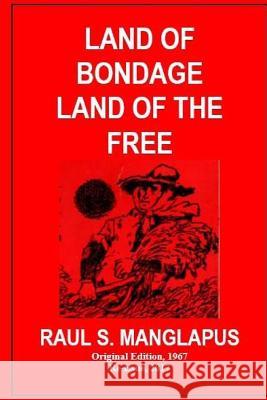Land of Bondage Land of the Free » książka
Land of Bondage Land of the Free
ISBN-13: 9781546457978 / Angielski / Miękka / 2017 / 238 str.
Raul S. Manglapus was born in Manila. He completed his Bachelor of Arts, summa cum laude. at the Ateneo de Manila in 1939 and pursued his study of law at the University of Santo Tomas, Manila and at Georgetown University, Washington, D.C. From 1948 to 1954 he was Professor of Constitutional Law at the College of Law of the Ateneo de Manila. Manglapus served in the Cabinet in 1954 as Undersecretary of Foreign Affairs, and later in 1957, as Secretary of Foreign Affairs. In 1961 he was elected Senator of the Philippines with the highest number of votes. His term of office ends in 1967, after which he will devote his time to the Christian Social Movement, to the practice of law and to his civic activities and speaking engagements in the Philippines and abroad. He has authored several books and his speeches have been anthologized. This publication gives insight to the brilliant years of his service to the Philippine government. Over the past two decades, a great social revolution has been sweeping through Asia. First stirred by the ideas and techniques, the philosophy and technology, the systems of government and material goods brought by Western colonizers, and then spurred on by the retreat of the colonizers after the war, the revolution has often taken on violent forms, sweeping away both the colonial masters and the traditional leadership, upsetting the old order, but not yet quite adjusted to the new. Indeed in many cases not yet Land of Bondage - Land of the Free Raul S. Manglapus 236 having devised a new political and social order to replace the old. In most countries of Asia, the revolution overthrew both colonial master and traditional leader in one blow. In the Philippines, however, the transfer of power from the United States to the traditional landowning elite was gradual and orderly. The sharp thrust of revolution was thus blunted, and the traditional elite remains in power to this day, heating down sporadic outbursts of armed rebellion. In most countries of Asia, the revolution overthrew both colonial master and traditional leader in one blow. In the Philippines, however, the transfer of power from the United States to the traditional landowning elite was gradual and orderly. The sharp thrust of revolution was thus blunted, and the traditional elite remains in power to this day, beating down sporadic outbursts of armed rebellion. But in recent years a quiet revolution has been taking shape in the Philippines intended to diffuse political and economic power among the masses. Uniquely in Asia, this revolution is being carried out through the regular democratic institutions. How this is being done can be seen clearly in the pages of this book, in which are reproduced the significant portions of the proceedings in the Philippine Senate on three revolutionary measures meant to redistribute power, currently in the hands of the elite few, among the long-dispossessed many. These measures would institute land reform, strengthen provincial and city governments and restore a degree of self-government to the Philippine village. All of them were sponsored by Senator Raul S. Manglapus, one of the leaders - and indisputably the most eloquent spokesman - of new Philippine challenge to the rule of its old oligarchy.
Zawartość książki może nie spełniać oczekiwań – reklamacje nie obejmują treści, która mogła nie być redakcyjnie ani merytorycznie opracowana.











